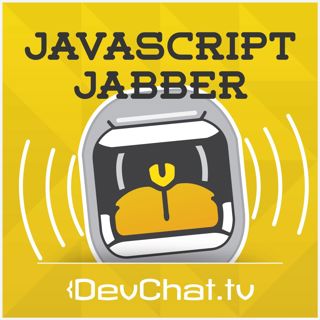
JSJ 357: Event-Stream & Package Vulnerabilities with Richard Feldman and Hillel Wayne
SponsorsTriplebyteSentry use the code “devchat” for $100 creditClubhouseCacheFlyPanelAaron FrostAJ O’NealChris FerdinandiJoe EamesAimee KnightCharles Max WoodJoined by special guests: Hillel Wayne and Richard FeldmanEpisode SummaryIn this episode of JavaScript Jabber, Hillel Wayne kicks off the podcast by giving a short background about his work, explains the concepts of formal methods and the popular npm package - event-stream, in brief. The panelists then dive into the recent event-stream attack and discuss it at length, focusing on different package managers and their vulnerabilities, as well as the security issues associated with them. They debate on whether paying open source developers for their work, thereby leading to an increase in contribution, would eventually help in improving security or not. They finally talk about what can be done to fix certain dependencies and susceptibilities to prevent further attacks and if there are any solutions that can make things both convenient and secure for users.LinksSTAMP model in accident investigationHillel’s TwitterHillel’s websiteRichard’s TwitterStamping on Event-StreamPicksJoe Eames:Stuffed FablesAimee Knight:SRE book - GoogleLululemon leggingsDVSR - BandAaron Frost:JSConf USChris Ferdinandi:Paws New EnglandVanilla JS GuidesCharles Max Wood:Sony Noise Cancelling HeadphonesKSL ClassifiedsUpworkRichard Feldman:Elm in ActionSentinels of the MultiverseHillel Wayne:Elm in the SpringPractical TLA+Nina Chicago - KnittingTomb TraderSpecial Guests: Hillel Wayne and Richard Feldman. Support this podcast at — https://redcircle.com/javascript-jabber/donationsPrivacy & Opt-Out: https://redcircle.com/privacyBecome a supporter of this podcast: https://www.spreaker.com/podcast/javascript-jabber--6102064/support.
26 Maalis 20191h 10min

JSJ 356: Build Websites Like It's 2005 with Keith Cirkel
SponsorsTriplebyteSentry use the code “devchat” for $100 creditClubhouseCacheFlyPanelChris FerdinandiAimee KnightAaron FrostAJ O’NealJoined by special guest: Keith CirkelEpisode SummaryIn this episode of JavaScript Jabber, Keith Cirkel, Senior Application Engineer at GitHub, briefly explains the projects he is working with and moves on to the recent changes done by GitHub to their website, including the decision to remove jQuery, and not choosing a popular framework such as React or Vue. He talks about some problems in using Internet Explorer 11, how these GitHub changes can help with certain browser compatibility issues, and a few challenges the team had to face during the redesigning process.The panelists then discuss event delegation, performance considerations, Polyfill.io and web components. Keith gives some insight into accessibility and they talk about related user concerns.LinksKeith’s websiteKeith’s GitHubKeith’s TwitterGitHub Engineering blogFinancial Times – Polyfill serviceInclude fragment - elementPicksAaron Frost:Bag ManWhat It’s Like to Be A Woman on the InternetAimee Knight:Smooth Sailing with KubernetesJoe Eames:GitHub Free users get free unlimited private repositoriesSwigThings I don’t know as of 2018AJ O’Neal:Isopropyl alcoholBang good electronicsSoldering Iron – Hakko, X-TronicKeith Cirkel:GitHub careersHeston’s Pod & ChipsBrexitChris Ferdinandi:52 things I learned in 2018Learn Vanilla JSSpecial Guest: Keith Cirkel. Support this podcast at — https://redcircle.com/javascript-jabber/donationsPrivacy & Opt-Out: https://redcircle.com/privacyBecome a supporter of this podcast: https://www.spreaker.com/podcast/javascript-jabber--6102064/support.
19 Maalis 201956min

JSJ 355: Progressive Web Apps with Aaron Gustafson LIVE at Microsoft Ignite
SponsorsSentry use the code “devchat” for $100 creditTriplebyteClubhouseCacheFlyPanelCharles Max WoodJoined by special guest: Aaron GustafsonEpisode Summary This episode of JavaScript Jabber comes to you live from Microsoft Ignite. Charles Max Wood talks to Aaron Gustafson who has been a Web Developer for more than 20 years and is also the Editor in Chief at “A List Apart”. Aaron gives a brief background on his work in the web community, explains to listeners how web standardization has evolved over time, where Progressive Web Apps (PWAs) come from, where and how can they be installed, differences between them and regular websites and their advantages. They then delve into more technical details about service workers, factors affecting the boot up time of JavaScript apps, best practices and features that are available with PWAs. Aaron mentions some resources people can use to learn about PWAs, talks about how every website can benefit from being a PWA, new features being introduced and the PWA vs Electron comparison. In the end, they also talk about life in general, that understanding what people have gone through and empathizing with them is important, as well as not making judgements based on people’s background, gender, race, health issues and so on.LinksCreating & Enhancing Netscape Web PagesA List ApartA Progressive Roadmap for your Progressive Web AppWindows Dev Center - Progressive Web AppsMDN web docsPWA StatsPWA Stats TwitterAaron’s websiteAaron’s Twitterhttps://www.facebook.com/javascriptjabber/https://twitter.com/JSJabberPicksAaron Gustafson:HomegoingZeitounCharles Max Wood:Armada Special Guest: Aaron Gustafson. Support this podcast at — https://redcircle.com/javascript-jabber/donationsPrivacy & Opt-Out: https://redcircle.com/privacyBecome a supporter of this podcast: https://www.spreaker.com/podcast/javascript-jabber--6102064/support.
12 Maalis 201955min

JSJ 354: Elm with Richard Feldman
SponsorsKendo UISentry use the code “devchat” for $100 creditClubhouseCacheFlyPanelJoe EamesAimee KnightJoined by special guest: Richard FeldmanEpisode SummaryIn this episode of JavaScript Jabber, Richard Feldman, primarily known for his work in Elm, the author of “Elm in Action” and Head of Technology at NoRedInk, talks about Elm 0.19 and the new features introduced in it. He explains how the development work is distributed between the Elm creator – Evan Czaplicki and the other members of the community and discusses the challenges on the way to Elm 1.0.Richard also shares some educational materials for listeners interested in learning Elm and gives details on Elm conferences around the world touching on the topic of having diversity among the speakers. He finally discusses some exciting things about Elm which would encourage developers to work with it.LinksElm in ActionFrontend Masters – Introduction to ElmFrontend Masters – Advanced ElmSmall Assets without the HeadacheElm GuideElmBridge San FranciscoRenee BalmertPicksAimee Knight:Most lives are lived by defaultJoe Eames:ThinksterRichard Feldman:Framework Summit 2018 – Keynote speechNix Package ManagerA Philosophy of Software DesignSpecial Guest: Richard Feldman. Support this podcast at — https://redcircle.com/javascript-jabber/donationsPrivacy & Opt-Out: https://redcircle.com/privacyBecome a supporter of this podcast: https://www.spreaker.com/podcast/javascript-jabber--6102064/support.
5 Maalis 201937min

JSJ 353: Signal R with Brady Gaster LIVE at Microsoft Ignite
Sponsors:NetlifySentry use the code “devchat” for $100 creditClubhousePanel:Charles Max Wood Special Guest: Brady GasterIn this episode, Chuck talks with Brady Gaster about SignalR that is offered through Microsoft. Brady Gaster is a computer software engineer at Microsoft and past employers include Logical Advantage, and Market America, Inc. Check out today’s episode where the two dive deep into SignalR topics.Links:VuejQueryAngularC#Chuck’s TwitterSignalRSignalR’s TwitterGitHub SignalRSocket.ioNode-SASSASP.NET SignalR Hubs API Guide – JavaScript ClientSignalR.netReal Talk JavaScriptParcelBrady Gaster’s TwitterBrady Gaster’s GitHubBrady Gaster’s LinkedInPicks:BradyTeam on General SessionKorgSeaHawksBrady’s kidsLogictech spot lightAirPodsCharlesExpress VPNHyper DriveJ5 ports and SD card readersPodwrenchSpecial Guest: Brady Gaster. Support this podcast at — https://redcircle.com/javascript-jabber/donationsPrivacy & Opt-Out: https://redcircle.com/privacyBecome a supporter of this podcast: https://www.spreaker.com/podcast/javascript-jabber--6102064/support.
27 Helmi 201951min

JSJ 352: Caffeinated Style Sheets: Supporting High Level CSS with JavaScript with Tommy Hodgins
SponsorsSentry- use the code “devchat” for $100 creditNetlifyClubhouseCacheFly Episode Summary In this episode of JavaScript Jabber, the panelists talk with Tommy Hodgins who specializes in responsive web design. He starts with explaining to listeners what it means by a responsive web layout and goes on to discuss the techniques in using JavaScript in CSS in depth.He elaborates on dynamic styling of components, event-driven stylesheet templating, performance and timing characteristics of these techniques and describes different kinds of observers – interception, resize and mutation, and their support for various browsers. He also talks about how to go about enabling certain features by extending CSS, comparison to tools such as the CSS preprocessor and Media Queries, pros and cons of having this approach while citing relevant examples, exciting new features coming up in CSS, ways of testing the methods, caffeinated stylesheets, along with Qaffeine and Deqaf tools.LinksJS in CSS – Event driven virtual stylesheet managerQaffieneDeqafTommy’s TwitterFizzbuzz PicksJoeThe Captain Is DeadAimeeDeveloper on CallTip – Try to follow a low-sugar dietChrisTommy’s snippets on Twitter – JS in CSSAll things frontend blogGulp projectCharlesCoaching by Charles in exchange of writing Show Notes or TagsTommyJS in CSSSpecial Guest: Tommy Hodgins. Support this podcast at — https://redcircle.com/javascript-jabber/donationsPrivacy & Opt-Out: https://redcircle.com/privacyBecome a supporter of this podcast: https://www.spreaker.com/podcast/javascript-jabber--6102064/support.
19 Helmi 201950min

JSJ 351: Dinero.js with Sarah Dayan
Sponsors- https://www.netlify.com/- http://sentry.io use the code "devchat" for $100 credit- https://clubhouse.io/jsjabberPanel:- Joe Eames- Aimee Knight- Chris Ferdinandi- AJ O’Neal- Charles Max WoodSpecial Guest - Sarah Dayan In this episode of JavaScript Jabber, the panelists talk to Sarah Dayan, who is a Frontend Software Engineer working for Algolia in Paris. They about the complications in handling money in software development and ask Sarah about the journey that led to the creation of Dinero.js, it’s implementation details, importance of maintaining good documentation, dealing with issues faced along the way, various features of Dinero and working with open source projects in general. Check it out!Show Topics:0.40 - Advertisement : https://www.netlify.com/ 1:44 - Sarah introduces herself and Chris talks about his interest in learning more about Dinero and compliments Sarah on its great documentation.3.10 - Sarah gives some background saying that she created and published Dinero around a year ago. She goes on to explain that the Dinero library helps in handling monetary values. It comes with several methods to parse, manipulate and format these values. The reason behind creating it is that there is no consensus on representing money in software development currently. She shares the story from her previous job where her work was to maintain legacy accounting software, and along the way they realized, that since JavaScript did not have a way to natively represent decimal values, it led to adding large numbers of rounded up numbers continuously, eventually leading to wrong computations.6:50 - Aimee asks about ways to handle different currencies in Dinero. Sarah answers that she has followed Martin Fowler’s money pattern where two different currencies were not allowed to be worked on directly, conversion was mandatory, just like in real life.7:50 - Charles talks about his old freelance work where he was overwhelmed while handling and representing money in software.8:25 - Aimee enquires if Dinero can be used for both frontend and backend. Sarah replies that it can be used anywhere and explains that there is no such thing as just a number when it comes to money, there must be a currency associated with it.9:30 - Charles asks how to figure out the direction to go to when dealing with money and to make sure that all use-cases are covered. Sarah answers that in cases such as floating-point math where the computations don’t end up being accurate as handling is not supported, numbers can be used if treated as subunits (for e.g. 100cents = 1$). However, even then, there are issues in dividing money. She then explains the procedure of “allocation” from the Fowler pattern and she says that Dinero helps in doing the same in such scenarios.12:54 - They discuss how they did not realize how difficult it was dealing with monetary values in development. Sarah talks about the fact that there are numerous aspects involved in it, giving the example of rounding off and stating that there are even factors such as different laws in different countries that need to be considered.16:00 - AJ asks details about crafting the library, maintaining the centralized code and covering of edge cases and using inheritance. Sarah explains the concept of domain driven development and the importance of being an expert in the respective domains. She talks about the library structure briefly, describing that is kept very simple with a module pattern and it has allowed her to manage visibility, make it immutable, include currency converters, formatters and so on.19:34 - AJ asks about the internal complexity of the implementation. Sarah answers that code wise it is extremely simple and easy, anyone with a limited JavaScript experience can understand it.20:50 - AJ asks if it’s open source to which Sarah answers in affirmative and says that she would like external help with implementing some features too.22:10 - Chris asks about Sarah’s excellent documentation approach, how has she managed to do it in a very detailed manner and how important it is in an open source project. Sarah says that she believes that documentation is extremely important, and not having good docs is a big hindrance to developers and to anyone who is trying to learn in general. She talks about her love for writing which explains the presence of annotations and examples in the source code.27:50 - Charles discusses how autogenerated documentation gives an explanation about the methods and functions in the code but there is no guidance as such, so it is important to have guides. Sarah agrees by saying that searching for exact solutions is much simpler with it, leading to saving time as well.29:43 - Chris speaks about Vue also being quite good at having guides and links and thanks Sarah for her work on Dinero.30:15 - Advertisement - https://sentry.io/welcome/ - Use code “devchat” to get two months free on Sentry’s small plan.31:23 - Chris asks what the process is, for creating and running Dinero in different places. Sarah explains that she uses rollup.js which is a bundler suited for libraries, it takes in the ES module library and gives the output in any format. She states that the reason for using the ES module library is that she wanted to provide several builds for several environments with a clean and simple source and goes on to explain that these modules are native, have a terse syntax, easy to read and can be statically analyzed. She also gives the disadvantages in choosing webpack over rollup.36:05 - Charles asks if anyone else is using Dinero. Sarah replies that around two or three people are using it, not much, but she is happy that it is out there to help people and she enjoyed working on it.37:50 - Joe asks if there are any interesting stories about issues such as involving weird currency. Sarah answers in affirmative and gives the example of the method “hasCents”. She explains that she had to deprecate it because the unit “cents” does not have any value in non-Western currencies, and has created “hasSubUnits” method instead. She explains some problems like dealing with currencies that don’t support the ISO 4217 standard.42:30 - Joe asks if social and political upheavals that affect the currencies have any effect on the library too. Sarah gives the example of Chinese and Japanese currencies where there are no sub-units and states that it is important to be flexible in developing stuff in an ever-changing domain like money. She also says that she does not include any third-party dependency in the library.46:00 - AJ says that BigInts have arrived in JavaScript but there is no way to convert between typed arrays, hexadecimal or other storage formats. But later (1:10:55), he corrects that statement saying that BigInts in fact, does have support for hexadecimals. Sarah talks about wanting to keep the code simple and keep developer experience great.49:08 - Charles asks about the features in Dinero. Sarah elaborates on wanting to work more on detecting currencies, improve the way it is built, provide better support for type libraries and get much better at documentation.52:32 - Charles says that it is good that Sarah is thinking about adopting Dinero to fit people’s needs and requirements and asks about different forms of outreach. Sarah says that she blogs a lot, is active on Twitter and attends conferences as well. Her goal is not popularity per se but to help people and keep on improving the product.55:47 - Chris talks about the flip side that as the product grows and becomes popular, the number of support requests increases too. Sarah agrees that open source projects tend to eat up a lot of time and that doing such projects comes with a lot of responsibility but can also help in getting jobs.59:47 - Sarah says that she is available online on her blog - https://frontstuff.io/, on Twitter as Sarah Dayan and on GitHub as sarahdayan.1:00:06 - Advertisement - https://clubhouse.io/ 1:01:01 - Picks!1:11:42 - END - Advertisement - https://www.cachefly.com/ Picks:Sarah- https://community.algolia.com/docsearch/AJ O’Neal- https://en.wikipedia.org/wiki/The_Legendary_Profile- https://www.amazon.com/Computer-Prevention-Ultra-Thin-Thinkpad-Protection/dp/B06XZMXPR7- https://www.amazon.com/How-Music-Works-David-Byrne/dp/1936365537Chris- https://twitter.com/innovati/status/1068998114491678720- https://www.youtube.com/channel/UCBa659QWEk1AI4Tg--mrJ2A- https://www.youtube.com/watch?v=OyJTF9z4-6YJoe- https://www.imdb.com/title/tt5511582/-Become a supporter of this podcast: https://www.spreaker.com/podcast/javascript-jabber--6102064/support.
12 Helmi 20191h 12min

JSJ 350: JavaScript Jabber Celebrates Episode 350!
SponsorsNetlifySentry use the code "devchat" for $100 creditClubhousePanel:Charles Max WoodAJ O’NealAimee KnightAaron FrostChris FerdinandiJoe EamesTim CaswellNotes:This episode of JavaScript Jabber has the panelists reminiscing on the past. First, they discuss the projects they’re working on. Tim has joined MagicLeap doing JavaScript and C++. Aaron Frost is one of the founders of HeroDevs. AJ works at Big Squid, a company that takes spreadsheets and turns them into business actions, and is expecting a daughter. Aimee has been exploring developer advocacy, but wants to focus primarily on engineering. She is currently working at MPM. Joe has taken over the CEO position for thinkster.io, a company for learning web development online. Chris switched from being a general web developer specializing in JavaScript and has started blogging daily rather than once a week, and has seen an increase in sales of his vanilla JavaScript educational products. Charles discusses his long term goal for Devchat.tv. He wants to help people feel free in programming, and help people find opportunities though the Devchat.tv through empowering content.Next, the panelists discuss their favorite episodes. Some of the most highly recommended episodes are JSJ 124: The Origin of Javascript with Brendan Eich (1:44:07) JSJ 161: Rust with David Herman (1:05:05) JSJ 336: “The Origin of ESLint with Nicholas Zakas” (1:08:01) JSJ 338: It’s Supposed To Hurt, Get Outside of Your Comfort Zone to Master Your Craft with Christopher Buecheler (43:36) JSJ 218: Ember.js with Yehuda Katz (42:47)Last, the panelists discuss what they do to unwind. Activities include working out, reading, playing Zelda and Mario Kart, studying other sciences like physics, painting miniatures, and Dungeons and Dragons.Picks:Charles Max WoodVillainous Board GameJoe EamesAzul Stained Glass Board GameAJ O’Nealhttps://www.digikey.com/Magnetic Hourglass: Amazon | Hobby Lobby $6 Aimee Knighthttps://www.nytimes.com/2018/12/24/well/mind/work-schedule-hours-sleep-productivity-chronotype-night-owls.htmlAaron FrostMatrix PowerWatchhttps://twitter.com/ChloeCondonChris Ferdinandihttps://learnvanillajs.com/Tim Caswellhttps://www.magicleap.com/https://textonascreen.rocks/https://history.lds.org/saintsSupport this podcast at — https://redcircle.com/javascript-jabber/donationsPrivacy & Opt-Out: https://redcircle.com/privacyBecome a supporter of this podcast: https://www.spreaker.com/podcast/javascript-jabber--6102064/support.
5 Helmi 20191h 6min






















